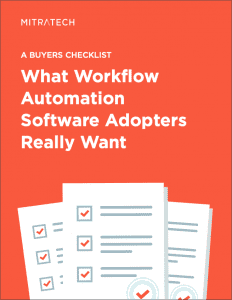If you’re keeping employees happy in the workplace, they’re more productive – new research confirms it. How can workflow automation make legal department staffers happier and more engaged with their work?
One recent study confirming the point was conducted in the U.K. by the Social Market Foundation and the University of Warwick’s Centre for Competitive Advantage in the Global Economy, and involved 700 subjects, according to Fortune:
The experiment showed that productivity increased by an average of 12%, and reached as high as 20% above the control group. By way of comparison, Dr. Daniel Sgroi, the author of the report, noted that in regards to GDP and economic growth, “rises of 3% or so are considered very large.”
The research involved showing subjects a short comedy clip, or providing snacks, or other small “happiness shocks” to raise their spirits. We’d submit another tactic for improving workplace morale: removing the dehumanizing drudgery of repetitive tasts through workflow automation.
In the legal industry, any means that can help alleviate the stress and pressure being put on lawyers would be welcome. The long hours, high-pressure stakes, and other factors involved are leading to burnout and alcohol and substance abuse.
A survey of nearly 13,000 attorneys by the ABA Commission on Lawyer Assistance Programs and the Hazelden Betty Ford Foundation found “20.6% screening positive for hazardous, harmful, and potentially alcohol-dependent drinking.”
How can legal workflow automation make a difference?
According to McKinsey, fewer than 5% of occupations can be entirely automated using present-day technology. But about 60% of occupations could have at least 30% of their activities automated.
Workflow automation improves employee satisfaction and engagement. Optimizing processes to both be more efficient and to empower people to maximize their talents creates a win-win for everyone. As Emily Bogin, Account Manager and TAP Workflow Automation expert at Mitratech explains:
“Automating repetitive tasks gives employees time to focus on what matters – and it also gives employers opportunities to raise internal morale – while helping the bottom line.”
So what are some of the many ways the happiness of a Legal Ops team benefits from legal workflow automation?
 By cutting human error (and reducing pressure on workers)
By cutting human error (and reducing pressure on workers)
Workflow automation of repetitive tasks removes human beings from tedious work – the kind that’s exactly where errors creep in. In a Legal Ops process, those errors can have drastic consequences. By reducing the number of mistakes, there’s less stress and pressure on staffers. They’re relieved of having to worry about the miniscule details of mundane activities.
 Better internal organization
Better internal organization
A best-in-class legal workflow automation solution will allow people to work from centralized documents and assets. So, they’re relieved of having to search for lost paperwork and mislain documents. Moreover, it’ll automatically track and archive workflows and associated assets. Now they can be easily accessed for review or if the workflow needs to be re-used; there’s no need to re-create essential forms or documents.
 Improving staff utilization
Improving staff utilization
 Slashing the need for supervision
Slashing the need for supervision
 Better communication and collaboration
Better communication and collaboration
 Ensuring employee engagement
Ensuring employee engagement
Happiness isn’t automatic…
…but by automating processes that were typified by routine, by relentless paper-pushing, keystroking, and other actions for whom most trained human beings are overqualified? Legal Ops can take a big step toward creating a workplace culture that’s built around maximizing the quality of engagement and kob satisfaction for each individual – not around the quantity of drudgery they’re forced to endure in doing their jobs.
As Mitratech’s Emily Bogin sums it up, “making a workload more manageable is a gift to everyone.”



